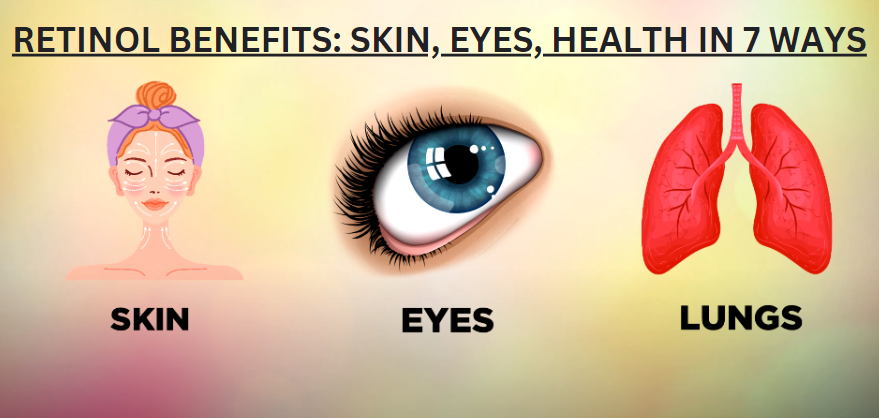What is retinol?
The unique health benefits of retinol. Retinol is the active form of vitamin A, an essential nutrient for the human body. For example, it plays a role in keeping the skin moisturized.
It protects the eyes against certain problems, and it even helps to maintain the tissues in your lungs, amongst many other benefits.
Fat Soluble (Retinol) vs. Water Soluble (Beta Carotene)

Fat-soluble (retinol) vs. water-soluble (beta-carotene) Retinol is fat-soluble, so it comes from foods like liver, egg yolks, butter, and wild fish. There’s also a precursor of vitamin A that you may have heard of called beta-carotene, and this is found in sweet potatoes, carrots, and leafy greens.
However, only 2–3% of this is converted into retinol, so you really must get the active form of it from animal-based foods.
In this article, we’ll explore the seven unique health benefits of retinol, its sources, and how you can absorb it properly as you age.
Just a quick reminder: this article is for educational purposes only, so do speak to a doctor if you have any medical issues.
1. Boosting collagen production in the skin

Boosting collagen production in the skin. Benefit number one of retinol is that it can boost collagen in the skin. Retinol is known as an anti-aging nutrient, as it helps to keep the skin elastic and youthful as you age.
There’s a synthetic version of this that is often added to skin creams and moisturizers, but unfortunately, it can only boost collagen when you’re getting it internally from natural food sources.
Retinol activates the production of type 1 and type 3 collagen, which are essential to maintain the healthy structure of your skin and also to reduce the formation of fine lines, wrinkles, and sagging skin as you age. Taking a virgin cod liver oil supplement is an excellent way to get this, but I’ll talk more about the best sources of it later.
2. Clearing up acne and dry skin

Clearing up acne and dry skin. Number two is clearing up acne and dry skin. Active vitamin A, known as retinol, is heavily involved in controlling the amount of oil in your skin by regulating sebum production.
Retinol helps to keep your skin moisturized and stops it from drying out, including the lips. At the same time, it prevents too much oil from being produced and clogging up the pores.
You can use a synthetic retinol skin cream or a moisturizer to help clear up acne, pimples, scarring, or redness. But the most effective method is to just get it internally from natural food sources, as some of these skin creams have very toxic ingredients.
3. Improving vision and eye health

Improving vision and eye health. Benefit number three of retinol is improving your vision. Real active vitamin A from animal sources directly supports the retina of the eye. This is an extension of your brain tissue.
Retinol helps to form a pigment in the eye called rhodopsin. This helps you to see better in low-light conditions, especially when you’re driving and your eyes need to adapt. Retinol maintains a healthy cornea to reduce the risk of eye ulcers and blindness.
It helps to keep the eyes lubricated and prevents dry eyes by controlling the tear glands. It also reduces the risk of macular degeneration and other eye disorders as we age.
As a side note, there’s a mineral called zinc, which is also very important, as it’s needed to transport retinol from the liver to the eyes. So you need this as well.
4. Protecting the Lungs and Sinuses (Lubrication)

Protecting the lungs and sinuses (lubrication). Number four is protecting your lungs and sinuses. Retinol goes beyond just skin and eye health; it also plays a role in lubricating and protecting the barriers on the inner skin of the body, such as the lungs, the sinuses, and the airways.
People who suffer from sinusitis, sinus headaches, dryness in the nose, frequent chest infections, or chronic rhinitis may simply have a retinol deficiency. This may be because they aren’t eating enough of this active vitamin A, or it could be because they have a lack of bile coming from their gallbladder, which is preventing them from absorbing it properly.










